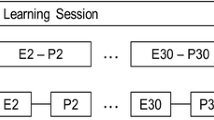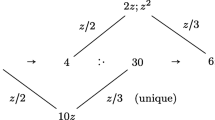Abstract
We present a computational framework designed to provide adaptive support aimed at triggering learning from problem-solving activities in the presence of worked-out examples. The key to the framework’s ability to provide this support is a user model that exploits a novel classification of similarity to infer the impact of a particular example on a given student’s metacognitive behaviors and subsequent learning.
Access this chapter
Tax calculation will be finalised at checkout
Purchases are for personal use only
Preview
Unable to display preview. Download preview PDF.
Similar content being viewed by others
References
Aleven, V., Ashley, K.D.: Teaching case-based argumentation through a model and examples: Empirical evaluation of an intelligent learning environment. In: Artificial Intelligence in Education, Kobe, Japan (1997)
Anderson, J.R.: Rules of the Mind. Lawrence Erlbaum Associates, Hillsdale (1993)
Atkinson, R., Derry, S., Renkl, A., Wortham, D.: Learning from Examples: Instructional Principles from the Worked Examples Research. Review of Educational Research 70(2), 181–214 (2002)
Chi, M.T.H., Bassok, M., Lewis, M.W., Reimann, P., Glaser, R.: Self-explanations: How students study and use examples in learning to solve problems. Cognitive Science 13, 145–182 (1989)
Chi, M.T.H., Feltovich, P., Glaser, R.: Categorization and representation of physics problems by experts and novices. Cognitive Science 5, 121–152 (1981)
Chi, M.T.H., VanLehn, K.: The content of physics self-explanations. The Journal of the Learning Sciences 1, 69–105 (1991)
Conati, C., Gertner, A., VanLehn, K.: Using Bayesian Networks to Manage Uncertainty in Student Modeling. Journal of User Modeling and User-Adapted Interaction 12(4), 371–417 (2002)
Conati, C., VanLehn, K.: Toward Computer-based Support of Meta-cognitive Skills: A Computational Framework to Coach Self-Explanation. International Journal of Artificial Intelligence in Education 11, 389–415 (2000)
Murray, C., VanLehn, K.: DT Tutor: A decision-theoretic dynamic approach for optimal selection of tutorial actions. In: 5’th Int. Conf. on ITS, Montreal, Canada (2000)
Novick, L.R.: Analogical transfer, problem similarity and expertise. Journal of Experimental Psychology: Learning, Memory and Cognition 14, 510–520 (1988)
Quilici, J., Mayer, R.: Role of Examples in How students Learn to Categorize Statistics Word Problems. Journal of Educational Psychology 88(1), 144–161 (1996)
Reed, S.K.: A structure-mapping model for word problems. Journal of Experimental Psychology: Learning, Memory and Cognition 13, 124–139 (1987)
Reed, S.K., Dempster, A., Ettinger, M.: Usefulness of analogous solutions for solving algebra word problems. Journal of Experimental Psychology: Learning, Memory and Cognition 11, 106–125 (1985)
Sweller, J., Cooper, G.A.: The use of worked examples as a substitute for problem solving in learning algebra. Cognition and Instruction 2(1), 59–89 (1985)
VanLehn, K.: Analogy Events: How Examples are Used During Problem Solving. Cognitive Science 22(3), 347–388 (1998)
VanLehn, K.: Rule-Learning Events in the Acquisition of a Complex Skill: An Evaluation of Cascade. The Journal of the Learning Sciences 8(1), 71–125 (1999)
VanLehn, K., Jones, R.M.: Better learners use analogical problem solving sparingly. In: Utgoff, P.E. (ed.) Machine Learning: Proceedings of the Tenth Annual Conference, pp. 338–345. Morgan Kaufmann, San Mateo (1993)
Weber, G.: Individual Selection of Examples in an Intelligent Learning Environment. Journal of Artificial Intelligence in Education 7(1), 3–33 (1996)
Author information
Authors and Affiliations
Editor information
Editors and Affiliations
Rights and permissions
Copyright information
© 2005 Springer-Verlag Berlin Heidelberg
About this paper
Cite this paper
Muldner, K., Conati, C. (2005). Using Similarity to Infer Meta-cognitive Behaviors During Analogical Problem Solving. In: Ardissono, L., Brna, P., Mitrovic, A. (eds) User Modeling 2005. UM 2005. Lecture Notes in Computer Science(), vol 3538. Springer, Berlin, Heidelberg. https://doi.org/10.1007/11527886_18
Download citation
DOI: https://doi.org/10.1007/11527886_18
Publisher Name: Springer, Berlin, Heidelberg
Print ISBN: 978-3-540-27885-6
Online ISBN: 978-3-540-31878-1
eBook Packages: Computer ScienceComputer Science (R0)





